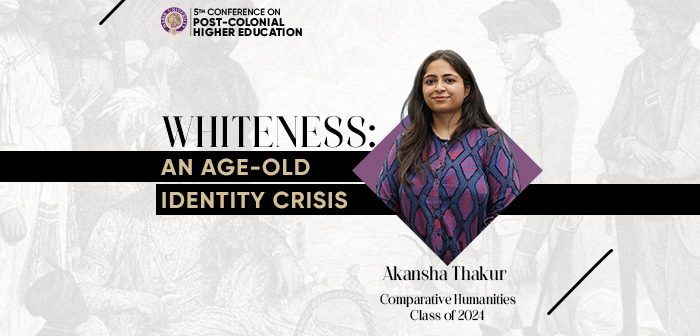When I think of whiteness, I imagine adopting the white man’s culture, mindset and ideologies. But whiteness goes beyond just incorporating these; whiteness is the binaries created in the socio-political systems on the basis of religion, caste, colour, creed and etc.
Whiteness is supremacy and not just racial supremacy, but class, biological and social supremacy. It is the romanticisation of that supremacy that further defines whiteness in our part of the world. It is an age-old crisis of identity and the making of identity politics.
For me, whiteness is when binaries are created to justify supremacy in the name of civilising. The segregation of racial and religious minorities through legislative means further imposes controlling the masses.
Dr. Malampalli, in the first session of the Conference, Whiteness and Colonial Governmentality, presented the Abraham vs Abraham case, which created a sectionalised form of social system – strengthening the roots of whiteness. It is also due to the saviour complex that situates the whiteness within one – this was discussed by Dr Mishal Khan as she referred to whiteness as “The Leviathan” in the last session of the conference, South Asia and the Colour Line. Perhaps it is this saviour complex that romanticizes the idea of supremacy. The emergence of Hindutva and Islamism in both sides of the border point to a saviour complex that is masked by the romanticism of religious supremacy.
Even beyond religious supremacy and its romanticism, there is one identified in social supremacy also. The “American Dream” is one example among many that illustrates the romanticisation of elite supremacy. In the South Asian context, the feudal systems can be perceived as an example of the romanticisation of social supremacy. In Pakistan, it is evident amidst the power play due to the feudal systems that are strengthened by colonial influence. The feudal system in Pakistan has been romanticised along with the absolute power which conceals the racial and social capitalism that persists under this system.
Pakistan’s feudal system glorifies and justifies the means of power to create exclusivity among communities, depriving them of their basic rights.
While such systems are romanticised, the establishment of racial capitalism and biological barriers are forgotten. Dr Mishal Khan’s research “Abolition as a Racial Project” explored racial capitalism in South Asia as Africans or Shidis that were enslaved to illustrate free labour in India. The abolition may strengthen the saviour complex, but through the feudal systems the remnants of abolition persist and the romanticisation of such binary systems continue.
At the end of the day, whiteness as a persistent element of our identity is always existing in various forms of powers. Dr. Arshin Adib-Moghaddem explains that the setting has changed for the discourse, but cannot be ignored. Whiteness has been and will continue to be a part of our identity – it is hard to escape from it.
As a notable quote from African-American writer James Baldwin from his story, “Sonny’s Blues,” says,
“All they really knew were two darknesses, the darkness of their lives, which was now closing in on them, and the darkness of the movies, which had blinded them to that other darkness, and in which they now, vindictively, dreamed, at once more together than they were at any other time, and more alone”.
This blog was written by Akansha Thakur, Comparative Humanities major, from the Class of 2024.




